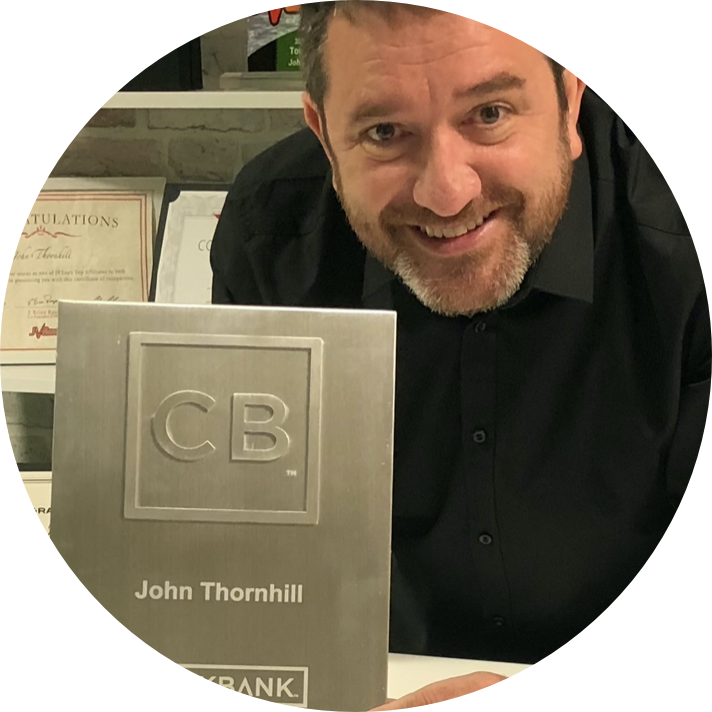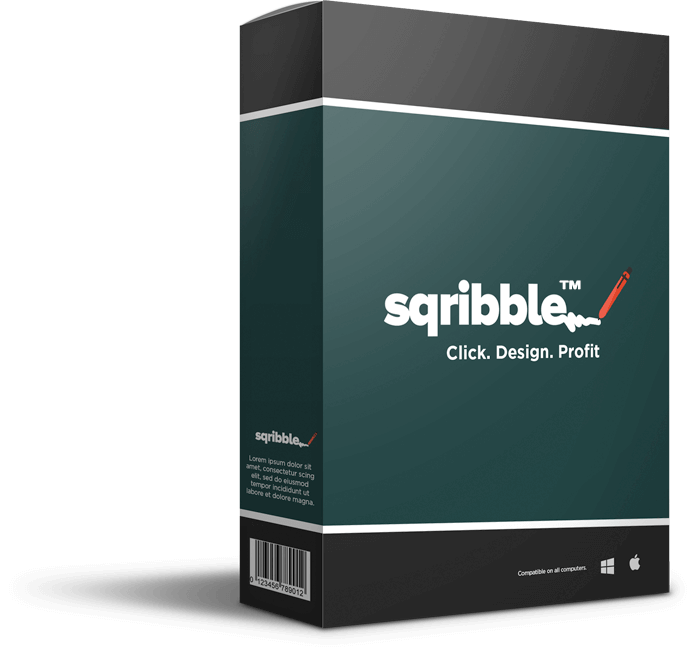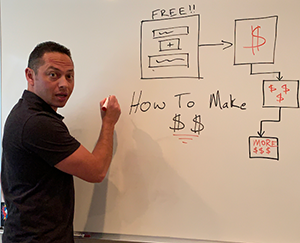Marketing For Supervillains
Marketing For Supervillains written by John Jantsch read more at Duct Tape Marketing
The Duct Tape Marketing Podcast with Jesse Wroblewski In this episode of the Duct Tape Marketing Podcast, I interviewed Jesse Wroblewski, the founder and CEO of a New York-based marketing agency and the author of Marketing for Supervillains: Diabolical Tips on Differentiation, Decommoditization, and World Domination. He has close to 30 years of experience in […]
Marketing For Supervillains written by John Jantsch read more at Duct Tape Marketing
The Duct Tape Marketing Podcast with Jesse Wroblewski
In this episode of the Duct Tape Marketing Podcast, I interviewed Jesse Wroblewski, the founder and CEO of a New York-based marketing agency and the author of Marketing for Supervillains: Diabolical Tips on Differentiation, Decommoditization, and World Domination. He has close to 30 years of experience in the marketing industry and has been featured in prominent media outlets like Rolling Stone and Fangoria. Known for his offbeat yet practical approach, he shares proven differentiation strategies that help businesses stand out in any market.
Key Takeaways
Questions I ask Jesse Wroblewski:
[01:29] Can you elaborate on using supervillains as role models in our marketing?
[03:20] When can polarization be beneficial in marketing?
[06:16] There are numerous Japanese references in your work. What draws you to Japanese culture?
[07:26] Could you highlight a few of your 12 differentiation methods?
[09:34] What’s more important to consumers: being better or different?
[11:56] How can conservative brands embrace differentiation without fear?
[13:02] What common traps do new clients fall into when trying to differentiate?
[14:27] How does authenticity impact marketing, positively and negatively?
[16:12] How can we stay current with trends without looking like we’re chasing every idea?
[18:43] What outdated marketing practices should be discarded immediately?
[21:04] Where can people connect with you or get your new book, “Marketing For SuperVillains: Diabolical Tips on Differentiation, Decommoditization, and World Domination”?
More About Jesse Wroblewski:
- Connect with Jesse Wroblewski on LinkedIn
- Visit his Website
- Grab a Copy of Marketing For Supervillains
- Check out his Youtube
Like this show? Click on over and give us a review on iTunes, please!
Connect with John Jantsch on LinkedIn
Testimonial (00:00): I was like, I found it. I found it. This is what I’ve been looking for. I can honestly say it has genuinely changed the way I run my business. It’s changed the results that I’m seeing. It’s changed my engagement with clients. It’s changed my engagement with the team. I couldn’t be happier. Honestly. It’s the best investment I ever made. What
John Jantsch (00:17): You just heard was a testimonial from a recent graduate of the Duct Tape Marketing certification intensive program for fractional CMOs marketing agencies and consultants just like them. You could choose our system to move from vendor to trusted advisor, attract only ideal clients, and confidently present your strategies to build monthly recurring revenue. Visit DTMworld/scale to book your free advisory call and learn more. It’s time to transform your approach. Book your call today, DTM World slash scale.
Hello and welcome to another episode of the Duct Tape Marketing Podcast. This is John Jantsch My guest today is Jesse Wroblewski. He has been at the helm of a New York marketing agency for close to three decades, is often offbeat work has been featured in Rolling Stone, the book by five weirdest websites ever, and fan Gora, as well as a plethora of other media outlets. He’s also the author of a book we’re going to talk about today, marketing for Supervillains, diabolical Tips on Differentiation, de commoditization, and World Domination. So Jesse, welcome to the show.
Jesse Wroblewski (01:39): Thank you so much. I figured my last name was long enough, so I decided to make all my intros and my titles even longer. So mouthful. Well done.
John Jantsch (01:50): Yeah, there was some hard words in there, that one. But speaking of names right, I usually ask us ahead of time. Did I nail the pronunciation?
Jesse Wroblewski (01:58): You did it well, absolutely.
John Jantsch (02:00): Awesome. Alright, so my first question is, what’s a supervillain got that we need to be using as a role model?
Jesse Wroblewski (02:08): Sure, sure. So there’s actually a lot of parallels. The first parallel, obviously being after 25 years of being in marketing, I think we all a little mad sometimes. So it’s some cynical takes on what’s going on in marketing. But what the real mantra was when you are a challenger entering a market, there’s usually always a mega brand, a name brand in the vertical, and that name brand is kind of like a superhero. They have huge public favor, they have huge muscles, which in marketing equates to huge budgets. And for a smaller guy entering the market, it’s almost a recipe for disaster to try and go head to head with them and try to out be more popular or spend more money. So if you think about movies, the supervi usually doesn’t have all the resources a superhero has. They certainly rarely have the same muscle tone, so they have to use their cutting wit and brains to outstart the bigger guy. So a lot of the book comes from an underdog mentality, a challenger brand mentality, and using things that the tried and true marketing that everybody else is doing, where you might not be able to compete on social media or SEO or pay-per-click going where the other guys,
John Jantsch (03:21): I noticed quite often with supervillain, there’s a bit of polarization too. I mean, a lot of people love the supervi in a movie, and of course a lot of people really hate them. Is there an element of that in our marketing that is actually kind of good to be a little polarizing?
Jesse Wroblewski (03:35): I think so. I think so. Being everything to everyone means you’re nothing to anybody. So I think I’d rather be adored by a few than in the middle of the road with a lot of people.
John Jantsch (03:48): So there are a whole lot of industries out there that feel, again, emphasis on the word feel, what they do is a commodity. I mean, there’s no way for me to differentiate except be the cheapest out there. What do you say? There might be occasionally a case where that’s true, but not very often, quite frankly is what I’ve discovered. And so what do you say to somebody that just feels like, oh, I dunno, we’re this kind of company and everybody’s the same?
Jesse Wroblewski (04:16): Yeah, absolutely. Because the crux of the book, so in the book, excuse me, most marketing books will tell you, run out, find your differentiator, and then figure it out and tell it to the world nice and succinctly. And that’s I meant task, right? That’s not easy to
John Jantsch (04:31): Do.
Jesse Wroblewski (04:32): So in the book, I codified 12 different ways that brands throughout history have successfully differentiated themselves. And for those that say, I’m really not that special or I can’t be, we’re just like everybody else. I always hawken back to the ultimate commodity, which is water. So water in the developed world is free, and if the government came along and said, what you do for a living, the government’s now going to offer for free. How would you continue to get people to pay a premium for something that can get for free? So rather than carrying a bucket of water around with you all day, which is free, you buy bottled water in the tune of 17, 18 billion a year, what are you really buying? Chances are you’re buying convenience of not carrying that bucket around, or maybe you have a bottle of water in your car and you’re buying refrigeration because it’s cooler in the refrigerator. So there’s a lot of byproducts for what we do. So you could say, I’m an accountant, I’m a marketer, I’m a this, I’m a that. But chances are you’re not really selling accounting, you’re not really selling marketing, you’re selling peace of mind, you’re selling convenience, you’re selling all these things that are secondary, but in the back of people’s minds, you’re actually curing a lot of anxieties. So I say any brand, any product in the world can absolutely be differentiated if you have enough courage.
John Jantsch (05:52): Well, and I remember Perrier and Evian, those water were cream brands. It was like, oh, you’re drinking that. Again, I think some of the shine has gone off of that, but I think at one point when it was unique, that was what they were selling was like, we’re the trendy water.
Jesse Wroblewski (06:09): Absolutely. Yeah. I mean, and the water industry just keeps growing and growing and us suckers keep throwing money at it.
John Jantsch (06:17): I’m curious, there are numerous Japanese references and throughout your work, is there a particular interest in the culture?
Jesse Wroblewski (06:24): I’m a lifelong martial artist, so I guess coming from, I was always the smaller guy in school, smaller stature. I was in, I think the largest high school in the country with 2,600 students, and I was the smallest guy in the high school. So I guess that was some stem of me kind of joining the martial arts. And there are a lot of, I say parallels or a lot of things that don’t equate to the English language, but are very relevant to lifestyle and marketing.
John Jantsch (06:54): Yeah, I think what’s interesting for other cultures is a lot of times there’s a word that literally means it doesn’t mean anything, but it’s a concept, if that makes sense. I never can remember it, but I live in the middle of a national forest and the Japanese word for forest bathing, which now I can’t remember, but it’s not a literal translation to that, but it’s a concept. I don’t know if we have many words like that in the English language that can’t really be translated other than a concept or a feeling. So you started talking about the, I think you said 11 or 12 ways. Is that your universe of differentiation? So do you want to hit on a couple of those by name?
Jesse Wroblewski (07:37): Sure, sure. So on my website there is a download of what we call the universe of differentiation, and it’s just a visual guide of 12 different planets that have each identified as a different way to successfully differentiate your business. And then once you figure out which differentiator resonates with you, your business, your brand history, then we kind of take a look at who lives on that planet. So who would be most attracted to that differentiator? So out of the 12, there are some common ones. So the first one that people are usually drawn to are definitives, differentiating by definitives. And you probably experienced this because this is the high time of differentiation for the summer. If you’ve ever seen an ad for a theme park, they use this differentiator like crazy, specifically talking about their rollercoaster. We have the tallest, the fastest, the scariest, the longest, the oldest, the most.
(08:34): The nice thing about differentiating by definitives is you rarely get challenged. So you can make pretty boastful claims, and there’s usually not a metric to challenge it. So you metric becoming commoditized. As a general marketing agency owner, I felt that I was on the verge of becoming commoditized. So I felt that I was usually the driving factor. Even though a client paid me money, I was always driving to get them to launch their website, give me your copy, give me your approval. So I deemed myself the world’s most proactive agency, the most proactive agency on earth, the no homework agency. So it’s a fun little way, you might need some additional differentiators, but it’s a fun exercise. Kind of say, Hey, I’m sticking a stake in the ground and this is my domain. I’m the blank industry.
John Jantsch (09:19): 25 years ago, I started calling Duct Tape Marketing, the world’s most practical small business marketing brand. And same idea, I had heard a couple of people tell me, well, your stuff is just so practical, but you’re right. I mean, nobody’s going to say, show me the statistics on that. Right? We’re more practical, better versus different. That’s an argument. I think a lot of people is like, we have the best widgets and well, that’s fine, but we have purple widgets. Which one of those do you think from a marketing standpoint is more important to a consumer?
Jesse Wroblewski (09:46): So I liken it back to differentiator versus USP unique sales proposition and people, they usually get them confused, and I’ll give you the best analogy that I can figure out. So going back to the example of water, the ultimate commodity there is a brand, one of my favorite brands, not only for water, which tastes the same as all the other waters, but for a marketing in general, which is liquid death. Have
John Jantsch (10:10): You heard of it? Yeah. I mean it’s absurd. So they have captured the imagination of the millennials like nobody else.
Jesse Wroblewski (10:18): Exactly, exactly. So while all the other brands are chasing their USP, Hey, we are hydrated more, we have a better delivery system, all these different things that tell you why their water is better, liquid death came along and just differentiated themselves and created a lifestyle brand to a very niche audience. And in my opinion, that differential blow away any USP that claims they’re better at what everybody else does.
John Jantsch (10:47): Yeah. Oh, go ahead. I’m sorry. Go ahead after you, sir. I was just going to say, so to some extent is one of the real goals of differentiation to actually project emotion feeling. You said lifestyle, I mean that whoever you’re trying to attract is actually more attracted to that than really any feature of the actual product or service.
Jesse Wroblewski (11:09): So I say finding your successful differentiator is the mic drop moment. So we, as marketers, and lucky for us, we get in bed with the company and it’s a rebrand. So we got to get a new logo, and then the competitor gets a new logo and it’s like, oh, we got to redesign our packaging, and then the competitor redesigns their packaging and we got to lower our prices and the competitor lowers their prices. If you could find that differentiator, that is the thing, here you go. No one can touch us. You can lower your prices, compete with us on a logo, the arms brace, that differentiator is checkmate. You can’t copy, you can’t clean up our dust. So I think that’s kind of the checkmate moment in marketing.
John Jantsch (11:52): So over the years, I’m sure you’ve experienced this, I have as well, particularly maybe a little more buttoned up brand that feels like, well, we’re architects, we’re professional service providers. This is what everybody in our industry does, which to me is the ultimate opportunity for differentiating, but they’re scared. I mean, wait, we don’t want to be seen as how do you get somebody over that idea that that’s actually screaming at you to be different?
Jesse Wroblewski (12:20): Absolutely, yeah. I mean, the common question I get asked, which you illustrated perfectly is different, is usually synonymous with odd or weird. But in the universe of differentiation, we have examples from brands like Rolex, Steinway, pianos, they all use the universe of differentiation to successfully differentiate themselves. And you may not associate Rolex with being different in your brain, but they’re head and shoulders above the competition because they have successfully differentiated themselves. So it’s not just for the outlandish or the guy that’s not afraid to wear a weird shirt for everybody.
John Jantsch (13:02): So when you go to start work with somebody, or maybe you’ve just seen people do this, you may not be a client of yours, what are some of the biggest traps they fall into? They’re like, drink the Kool-Aid. Yes, we need to be different. But then they screw it up.
Jesse Wroblewski (13:18): Everyone asks me, how do I get the client over that final hurdle? So everybody comes to the table, whether it’s marketing or whether it’s fitness, I want to get fit. I’ll do anything. I’ll get up at 5:00 AM I’ll run 50 miles, and then five weeks from now you’re sleeping in and in that discipline. So I tell my clients that I am great at branding and differentiating, but I suck at reading minds. So trying to get them to be vulnerable and look, we have at minimum 12 opportunities to differentiate If you say, Hey, you know what? I really don’t feel like comedy or being approachable is synonymous with my brand, let’s figure that out upfront. That way when we get to the finish line, I don’t come up with you with this crazy outlandish head, and now you got to stay up at night. We’ll get all the vulnerability out of the way in the beginning, and we could make great decisions leading up to the finish line. And then the rest is data. What is the data support? Then we pull the trigger. So it’s never a frictionless effort, but I think setting the bar, setting the table properly can be very beneficial.
John Jantsch (14:27): What role do you think authenticity plays both for good and bad? I mean, we’re a stodgy old brand, but we’re going to do something to so those kids like us, and it just doesn’t really come off. I mean, so how important is it that it not only be different, but it be real and true?
Jesse Wroblewski (14:46): Yeah, so I think it’s a term that’s thrown around too
John Jantsch (14:50): Completely.
Jesse Wroblewski (14:52): No one knows what the hell it means. But I say in my book, and I am absolutely guilty of this, I failed a bunch of times repositioning my agency, and it was great fodder for the book. And one of the ways I failed was I was 100% logical about my repositioning, which means I found an industry that had a problem that I could solve. They had a ton of money that they were throwing in marketing, and I basically said, Hey, I can come in and revolutionize this market, but when it came down to writing a blog about it or attending a trade show, I was like, it was homework. It was nothing I would’ve had rather done. So it really wasn’t authentic to me. So I think it’s not a pivotal ingredient, but if you can align it with your differentiator, that’s such a huge leg up on your path to success. So if you are a differentiation pairs with your natural authenticity, it’s going to be a huge headstart for you.
John Jantsch (15:50): Alright, let’s talk a little bit about rebranding. You see a lot of companies out there that feel like, oh, it’s been five years since we’ve done this, and sometimes they’re sort of informed by trends. I mean the hottest business going, apparently today is an AI marketing agency, and 10 years ago it was a social media marketing agency. So how do we balance that idea of we want to stay current, but we also kind of look silly chasing the idea of the week?
Jesse Wroblewski (16:23): Yeah, yeah. I mean, it’s a tough question that I don’t necessarily have the answer to other than every pendulum is going to swing the other way. So we were actually contemplating at our agency as everybody’s trying to be AI this AI that coming right out and saying, we are the 100% human agency, anti ai, everything you get will be created by a human with human feel, human emotion. So if you’re thinking of chasing a trend and it doesn’t feel authentic or it’s rubbing you the wrong way, maybe the pendulum coming back the other way, you might be able to position yourself for the future.
John Jantsch (16:59): Yeah, I mean, once Twitter put out a user guide, all of those social media marketing agencies went out of business, didn’t they? And I think it’s important to really understand that fundamentally what we’re here to do, you would probably agree with this in the marketing space, actually hasn’t changed. I’ve been doing this for 30 years as well, and I think that’s probably a point of view that people lose track of, isn’t it?
Jesse Wroblewski (17:21): Absolutely. Yeah. I mean, I put out a video just kind of a lot of the perspective of my book is a cheerleading for our fellow marketers. So we as marketers have been through a ton of revolutions, and if I say, if your marketing agency didn’t call you and try to get you to open your wallet for NFTs, clubhouse, the Metaverse, all these things, you should call them up and just thank them, right? Because as a salesman, I’m always looking for a chance to upsell, but I have a fiduciary responsibility to tell my client, Hey, you know what? Maybe we don’t invest in Snapchat right now, or maybe we don’t jump into the metaverse. And often distaste they kind of want it even though I tell them not to. So it takes a ton of integrity to be a marketer and that easy money in regards for your client’s wellbeing.
John Jantsch (18:12): Yeah. The question that has served me well over the years is when some new tool has come along, I’ve said, how could this help me serve my existing clients better? And if I couldn’t really see a practical way to do that, I mean, NFTs, I was drawn by the hype, but I just looked at it and went, what? How? Yeah.
Jesse Wroblewski (18:34): Yeah. And it’s hard. You get those phone calls, Hey, I want to do an NFT, and it’s easy money, but it’s also you got to battle with your integrity. So yeah, I agree.
John Jantsch (18:44): Sitting where we are today in 2024, we’re recording this. Are there any current shortcomings in traditional marketing practices that we all still see or have seen for the last 10 years that you think people need to immediately chuck?
Jesse Wroblewski (18:59): Yeah, I think exactly what you just touched upon. So I’m a big analogy guy. So I am not a party goer. I kind of go to the party, I make sure everybody sees me, I make my appearance, and then I bounce. So I could say I was there. I think a lot of businesses take that approach with social media. They just want to be in the conversation. They don’t provide any value, they don’t even provide a dialogue. It’s more of a monologue, and they’re just putting mindless content out there. And I think as I call it, commoditized content. As commoditized content grows, and now we’re seeing a massive spike with ai, how much content, completely useless content is going to be swarming these social media platforms. There was an interesting stat that came out for the first time in human history. Something happened on the humankind level that people are willing to pay more for less meaning people have suddenly realized that instead of paying a hundred dollars to my cable company for 200 channels, which works out to 50 cents a channel, I’d rather pay $5 for one channel and get rid of all the crap.
(20:05): So I call it human climate change. We’re changing the way we take in content because there’s just so much of it. And I think that’s unquestionably going to be in the form of marketing, particularly social media, where if you’re putting out crap, people are not only going to ignore you, they’re going to repel you and do whatever they can to get you out of their funnel of
John Jantsch (20:25): Well, and I think marketers for the last 10 years have gotten pretty lazy ad targeting. It’s been pretty easy to do. Actually getting results in search engines has actually been pretty easy to do if you knew what you were doing, and I think it made a lot of marketers lazy when some of that goes away, I think a great deal of what you’re talking about is going to be the thing that draws into specific businesses.
Jesse Wroblewski (20:49): Absolutely. Absolutely. Yeah. I mean, they just took away the middleman and now everybody can market and everybody shouldn’t market. It’s in our forum. I think we’re going to finally start learning that again.
John Jantsch (20:59): Yeah, more than ever strategy. So Jesse, I appreciate you taking a moment to stop by. Is there someplace you’d invite people to connect with you or certainly pick up a copy of marketing for supervillains?
Jesse Wroblewski (21:09): Sure. I would love everyone to check it out. It’s all available on Amazon, Barnes and Noble, and I tell everyone that I am at heart a frustrated filmmaker, so I put lots of explosions and lasers into my YouTube videos. So if you find me on commoditized on YouTube, I’m sure you’re going to find a video on there that’s entertaining and educational.
John Jantsch (21:31): Awesome. Well, again, I appreciate you spending a few moments with us. Hopefully we’ll run into you one of these days out there on the road.
Sign up to receive email updates
Enter your name and email address below and I’ll send you periodic updates about the podcast.
Recommended Story For You :

How To Make $3493 Commissions Without Doing Any Selling

Successful dropshippers have reliable suppliers.

People Think I Use A Professional Voiceover Artist. NO! I Just Use Speechelo!

Make Money Testing Apps On Your Phone Or Tablet

Make More Money or Lose Everything

Sqribble Is The ONLY eBook Creator You’ll Ever Need.

Work & Earn as an Online Assistant

Create Ongoing Income Streams Of $500 To $1000 Or More Per Day

It's The Internet's Easiest Side Business.

